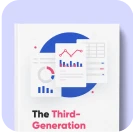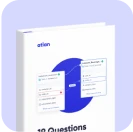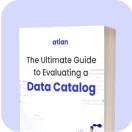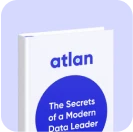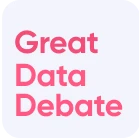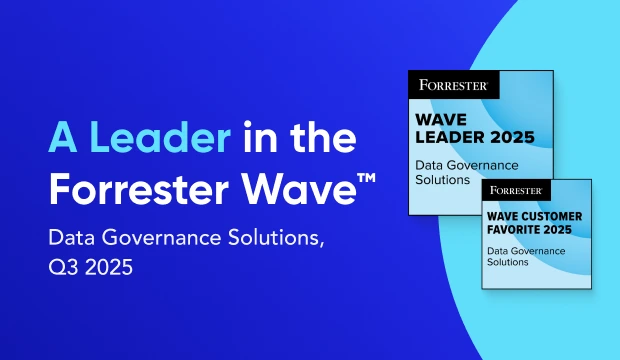Data Governance vs Business Glossary: Are They Connected?
Share this article
The main difference between data governance and a business glossary is that data governance is about managing and organizing data effectively.
Meanwhile, a business glossary is a tool for establishing a unified language and understanding of business terms, definitions, concepts, and metrics across your organization.
This article looks into the fundamentals of data governance and business glossary to explain the differences and explore how they work in tandem.
Table of contents #
- Data governance vs business glossary: Concepts to understand
- Data governance vs. business glossary: Are they related?
- Data governance vs business glossary: 7 key differences
- How does business glossary help with data governance?
- Summing it all up
- Related reads
Data governance vs business glossary: Concepts to understand #
Let’s begin by understanding the fundamentals, starting with data governance.
Data governance: An overview #
Data governance is a scalable way of ensuring that your data is accurate, consistent, available, and secure. This helps ensure data enablement and collective accountability for your data assets.
Read more → Getting started with active data governance
The core components of data governance include (but aren’t limited to):
- Data governance framework
- Roles and responsibilities
- Policies and procedures
- Data cataloging and metadata management
- Data quality, security, and privacy
- Data integration and interoperability
- Data stewardship
Read more → Data governance key components 101
Data governance can only be effective if it’s a part of everyone’s daily workflows, rather than being an extra step in your operations. That’s why everyone is responsible and should be held accountable for the data they create, consume, and manage.
Also, read → 7 best practices for data governance
An active data governance platform like Atlan comes equipped with features to handle data policies and rules, strengthen data security, automate data lineage tracking and data quality checks, and more.
Business glossary: An overview #
A business glossary is a collection of unique business terms and definitions. It helps understand the data assets’ key characteristics. It creates a common data language across an organization by building an open knowledge base of business terms, concepts, and metrics.
The core components of a business glossary include (but aren’t limited to):
- Terms, concepts, and definitions
- Data categorization
- Metadata
Business users should be responsible for building, maintaining, and enriching the business glossary.
Read more → Business glossary 101
Data catalogs like Atlan come equipped with a modern business glossary that includes information on data relationships, similar assets, etc.
We call Atlan “an activated knowledge network for your business, where you can create relationships between definitions, metrics, and assets.”
Data governance vs. business glossary: Are they related? #
A business glossary is a key step to implementing and maintaining effective data governance.
As mentioned earlier, the business glossary creates a common data language across the organization by defining and standardizing terms and concepts. It also provides additional information about an asset, such as context and ownership.
This in turn:
- Standardizes data definitions, descriptions, etc. so that everyone speaks and understands the same common language
- Promotes data visibility and drives collaboration among team members by unifying knowledge
- Sets standards for data quality — accuracy, consistency, and credibility
- Helps with data lineage mapping so that you can understand data asset relationships better
All of these factors improve confidence and trust in your data. Everyone interprets and uses data consistently.
Read more → How is a business glossary the key to data discovery and governance?
Data governance vs business glossary: 7 key differences #
In this segment, we provide a comprehensive comparison of data governance and business glossary in an easy-to-read table.
| Data Governance | Business Glossary | |
|---|---|---|
| Definition | A personalized, community-centered approach to ensure that your data is accurate, consistent, available, and secure. | A centralized knowledge bank with key business terms and concepts used in the day-to-day operation of an organization. |
| Purpose | Provide an organizational framework for data management, while aligning with business goals and regulations. | Capture and maintain human tribal knowledge to avoid inconsistencies and misunderstanding of data. |
| Components | Policies and procedures, data security and privacy, metadata management, etc. | Terms and definitions, categorization of your assets, metadata. |
| Activities | Involves establishing data policies, standards, classification and tagging rules, access controls, data integration and interoperability infrastructure, etc. | Involves documenting business concepts, terms, definitions, and metrics, and also captures the associated metadata. |
| Benefits | Improved data quality, compliance with regulations, minimized data risks, and better decisions. | Better data governance, greater collaboration, and a decrease in data chaos |
| Stakeholders involved | Data stewards, data owners, compliance officers, and data management teams | Business users, data stewards |
Also, read → How to select the best data governance tool
How does business glossary help with data governance: A case study from Brazil’s insurance sector #
Porto’s background and challenges with data #
Founded in 1945, Brazilian insurance and banking giant Porto has roughly 14,000 employees, 17,000 contractors, and 13 million clients.
The company found it difficult to locate, understand, share, and use data because of the size and complexity of its organization.
Their existing legacy data catalog wasn’t making things any easier.
“The motivation to look for a different solution came from some difficulties in implementing certain features like lineage, a business glossary. It was kind of frustrating, and it came to a point where we felt like the technology was kind of blocking us from reaching where we wanted to go.” - Danrlei Alves, Senior Data Governance Analyst at Porto
As a result, finding context before modeling data involved Porto’s data scientists scouring the organization to find a subject matter expert who could answer their questions.
Setting up Datapedia: A DIY data discovery hub #
That’s why Porto’s data governance team was looking for a way to build Datapedia, a self-service single source of truth for their data assets.
It would be a hub of business knowledge where any employee can search for any information they might need about Porto’s business, without asking questions to subject matter experts or colleagues.
For instance, a quick glance at the definition of an asset in Datapedia should provide their data scientists all the information required to continue researching or start designing a data model right away.
“I just type what I would like to find out, and if it’s within our reach, then it will just pop up.” - Danrlei Alves, Senior Data Governance Analyst at Porto
Datapedia would also help new recruits (interns, employees, contractors, etc.) understand Porto’s business better.
How Datapedia saved time, improved data discovery, and impacted Porto’s data governance efforts #
Porto’s data governance team used Atlan to build Datapedia within six weeks. This included documenting and organizing more than a million data assets.
In the process, they automated several manual tasks related to data governance, such as:
- Classifying and documenting data assets (including PII data)
- Assigning owners to each asset in Datapedia
- Updating over a million data assets along with adequate documentation daily
These activities are now saving 40% of the data governance team’s time, which they can use to optimize their processes and be more productive.
Read more → How Porto is more than a data catalog with Atlan
Summing it all up #
Data governance is a program to ensure the accuracy, credibility, integrity, privacy, and security of your data assets. It tells you what data you have, where that data is stored, and how can you use it. The goal is to help you arrive at better business insights using your data.
An essential aspect of data governance is to establish a common language across your organization. This lays the groundwork for effective communication, collaboration, and understanding of critical data assets.
That’s where a business glossary can help. It plays a pivotal role in standardizing data asset definitions, descriptions, categorization, etc., thereby providing clarity on your data estate.
Porto’s case study establishes the symbiotic relationship between a robust data governance program and a well-designed business glossary. Together, a solid data governance program and business glossary can help you with effective data management.
Data governance vs business glossary: Related reads #
- What is Data Governance? Its Importance & Principles
- Data Governance 101: Principles, Examples, Strategy & Programs
- Data Governance Framework — Guide, Examples, Template
- Data Governance Roles and Their Responsibilities
- Data Governance and Compliance: Act of Checks & Balances
- How to implement data governance? Steps, Prerequisites, Essential Factors & Business Case
- How to Improve Data Governance? Steps, Tips & Template
- Automated Data Governance: How Does It Help You Manage Access, Security & More at Scale?
- Enterprise Data Governance Basics, Strategy, Key Challenges, Benefits & Best Practices
- Business Glossary: Everything You Need to Know
- Business Glossary: The Key to Data Discovery & Governance
- Data Governance vs Data Security: 7 Key Differences in 2025
- Data Governance vs Data Analytics: Which is the best for you?
- Data Quality vs Data Governance: Learn the Differences & Relationships
Share this article


